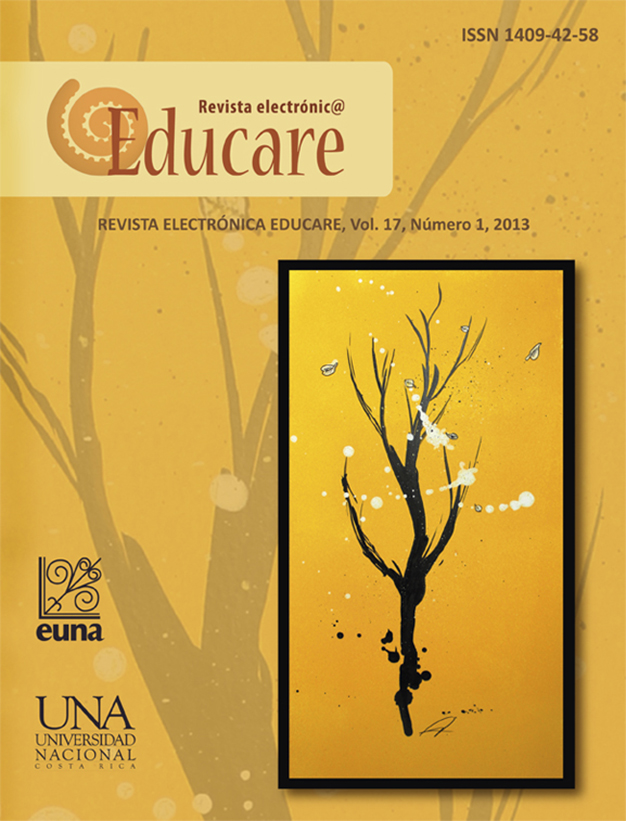Accessible Spaces in Inclusive Schools
DOI:
https://doi.org/10.15359/ree.17-1.5Keywords:
Universal accessibility, school community, infrastructure, evaluation, Educare Electronic Journal, Costa Rica.Abstract
This literature review is focused on physical accessibility, a basic requirement in educational institutions to ensure that all members of the education community have access to inclusive settings, where they can exercise their duties and rights by themselves. In addition, it summarizes theoretical proposals –the universal design, for instance–, which can guide staff members from these institutions and professionals related to space management, in assessing and achieving appropriate spaces.
References
Agencia de Cooperación Internacional del Japón (JICA), Consejo Nacional de Rehabilitación y
Educación Especial (CNREE). (2006). Las necesidades y oportunidades de las personas con
discapacidad en Costa Rica. San José: Autores.
Alfaro, D. (Comp.). (2003). Código urbano (9ª ed.) San José, Costa Rica: Editorial Porvenir.
Asamblea Legislativa de la República de Costa Rica. (1996). Ley 7600 Igualdad de oportunidades
para las personas con discapacidad. San José: Costa Rica.
Asamblea Legislativa de la República de Costa Rica. (2007). Ley 8661. Convención sobre los
derechos de las personas con discapacidad. San José: Costa Rica.
Casado, D. (2003). Accesibilidad con seguridad del medio físico. Ingeniería y territorio, 63, 12-15.
Recuperado de http://www.ciccp.es/revistaIT/textos/pdf/02_D.Casado_63.pdf
Consejo de la Tierra (Proyecto de accesibilidad en áreas protegidas para personas con
discapacidad). (2002). Guía para la realización de un plan de accesibilidad en áreas protegidas.
San José, Costa Rica: Fundación Fundecooperación para el desarrollo sostenible.
De Asís, R. (2008). Derechos humanos y situaciones de dependencia. España: Dykinson.
De Rojas, C. y Santos, J. (2005). Mantenimiento y accesibilidad. En Real Patronato sobre
Discapacidad y Fundación ACS (Eds.). Manual para un entorno accesible (9ª ed., pp. 293-
. España: Industrias Gráficas Caro.
Domènech, J. y Viñas, J. (2007). La organización del espacio y del tiempo en el centro educativo (6°
ed.). España: Graó
García, J. (2005). Accesibilidad en la edificación. En Real Patronato sobre Discapacidad y
Fundación ACS (Eds.), Manual para un entorno accesible (9ª ed., pp.17-35). España:
Industrias Gráficas Caro.
Guillamón, J. (2003). La accesibilidad, reto profesional y exigencia social. Ingeniería y Territorio,
, 4-9.
Heredero, E. S. (2008). A la calidad de la educación desde los espacios escolares: Visión del
profesorado y perspectivas en la educación castellano-manchega. España: Universidad de
Alcalá.
Juncà, J. (2005). Movilidad accesible. En Real Patronato sobre Discapacidad y Fundación ACS
(Eds.), Manual para un entorno accesible (9ª ed., pp. 97- 237). España: Industrias Gráficas
Caro.
Molina, O. M. (2008). La accesibilidad universal: Un deber de la Universidad de Costa Rica para
la inclusión de todas las personas. (Tesis de Maestría). Sistema de Estudios de Posgrado.
Universidad de Costa Rica, San José, Costa Rica.
UNESCO. (2003). Superar la exclusión mediante planteamientos integradores en la educación.
Un desafío y una visión. Recuperado de http://www.uam.es/personal_pdi/stmaria/
sarrio/DOCUMENTOS, ARTICULOS, PONENECIAS,/Documento
UNESCO sobre educacion
inclusiva.pdf
Universidad Complutense de Madrid. (s. f). Accesibilidad y supresión de barreras arquitectónicas.
Guía para visualización inmediata. Madrid: Oficina para la Integración de Personas
con Discapacidad. Recuperadode http://sid.usal.es/idocs/F8/FDO7637/accesibilidad_
supresion_barreras.pdf
Ureña, L. R. (2007). Accesibilidad universal en las escuelas Buenaventura Corrales y Pilar Jiménez.
(Tesis de licenciatura). Escuela de Ingeniería Civil, Facultad de Ingeniería, Universidad de
Costa Rica, San José, Costa Rica.
Víquez, M. (s. f). Accesibilidad física. San José, Costa Rica: Consejo Nacional de Rehabilitación y
Educación Especial.
Downloads
Additional Files
Published
How to Cite
Issue
Section
License
1. In case the submitted paper is accepted for publication, the author(s) FREELY, COSTLESS, EXCLUSIVELY AND FOR AN INDEFINITE TERM transfer copyrights and patrimonial rights to Universidad Nacional (UNA, Costa Rica). For more details check the Originality Statement and Copyright Transfer Agreement
2. REUTILIZATION RIGHTS: UNA authorizes authors to use, for any purpose (among them selfarchiving or autoarchiving) and to publish in the Internet in any electronic site, the paper´'s final version, both approved and published (post print), as long as it is done with a non commercial purpose, does not generate derivates without previous consentment and recognizes both publisher's name and authorship.
3. The submission and possible publication of the paper in the Educare Electronic Journal is ruled by the Journal’s editorial policies, the institutional rules of Universidad Nacional and the laws of the Republic of Costa Rica. Additionally, any possible difference of opinion or future dispute shall be settled in accordance with the mechanisms of Alternative Dispute Resolution and the Costa Rican Jurisdiction.
4. In all cases, it is understood that the opinions issued are those of the authors and do not necessarily reflect the position and opinion of Educare, CIDE or Universidad Nacional, Costa Rica. It is also understood that, in the exercise of academic freedom, the authors have carried out a rogorous scientific-academic process of research, reflection and argumentation thar lays within the thematic scope of interest of the Journal.
5. The papers published by Educare Electronic Journal use a Creative Commons License:














 The articles published by Educare Electronic Journal can be shared with a Creative Commons License:
The articles published by Educare Electronic Journal can be shared with a Creative Commons License: 



